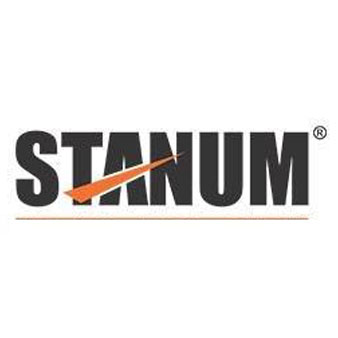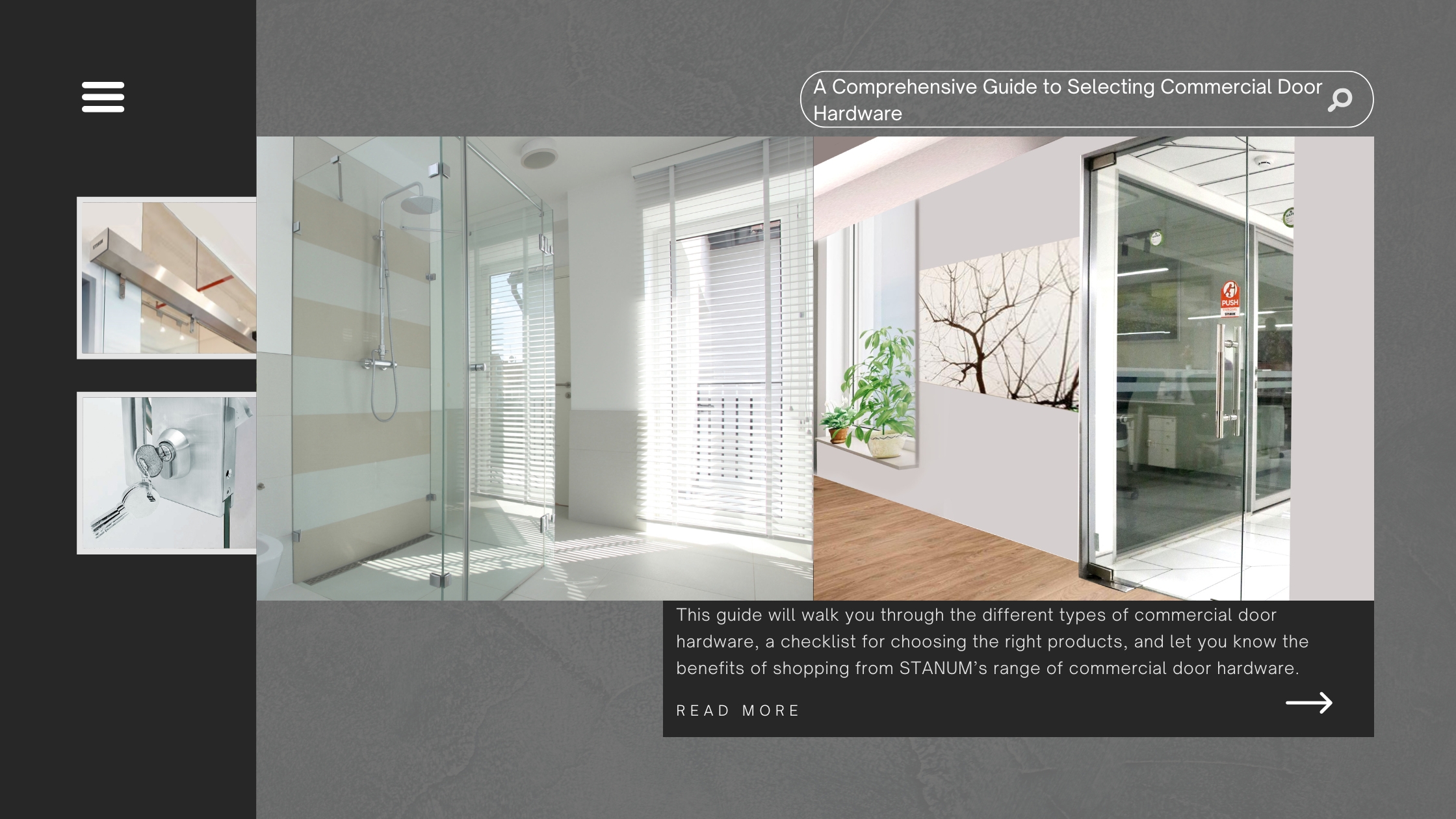Door hardware and fittings are fundamentals of any space as they provide your building functionality, security, and durability. Door hardware plays a pivotal role in ensuring the security, accessibility, and overall design integrity of a space. It includes components like locks, handles, hinges, and latches, which are essential for securing doors and controlling access to different areas. Beyond security, quality door hardware enhances convenience by providing smooth operation and durability, reducing wear and tear over time. It also contributes to the visual appeal, complementing architectural styles and interior designs. Well-chosen hardware can elevate the look of a door, making it a key element in the overall decor while fulfilling practical requirements.
Choosing the right commercial door hardware is essential for ensuring the proper functionality, safety, and aesthetics of any building. Whether it’s an office complex, a hotel, a retail store, or any other commercial space, quality hardware can make a significant difference in both the user experience and the building's overall appearance. This guide will walk you through the different types of commercial door hardware, a checklist for choosing the right products, and let you know the benefits of shopping from STANUM’s range of commercial door hardware.
Types of Commercial Door Hardware
If you very well understand the different types of commercial door hardware, you can simply select the right products for your specific needs. Here’s a breakdown of the key components:
1. Door Handles
A door handle assists your door in opening, closing, or securing it. It provides a convenient grip or lever that allows users to manipulate the door, enabling access to or from a space. In addition to functionality, door handles often play a role in locking mechanisms, ensuring security when combined with a lock. Door handles come in various styles and materials, offering both practical use and aesthetic appeal, which can enhance the design and decor of a room or building. Door handles are essential for everyday convenience, accessibility, and safety in residential, commercial, and industrial settings. The main types include:
- Lever Handles: Popular in commercial settings due to their ease of use and accessibility. Lever handles are available in different finishes like stainless steel, chrome, and brass.
- Pull Handles: Ideal for glass doors and entrance doors, pull handles offer a sleek look and are designed for heavy traffic areas.
- Panic Bars/Exit Devices: These are responsible for emergency exits in commercial buildings. They allow for quick and easy exit in case of emergencies.
2. Locks
Locks secure commercial spaces by providing your doors, cabinets, and other entrances with an additional safety feature of being opened without the correct key, code, or mechanism. Locks protect unauthorized access, ensuring safety and privacy in both residential and commercial settings. Locks come in various types, including deadbolts, padlocks, and electronic locks, each serving specific security needs. The types of commercial locks may include:
- Mortise Locks: Known for their durability and strength, mortise locks are often used in high-traffic areas. They are embedded within the door, making them more secure.
- Cylindrical Locks: Easy to install and commonly used in offices and interior spaces, cylindrical locks are suitable for doors that do not require high-security measures.
- Smart Locks: With the advent of technology, smart locks are becoming popular in commercial spaces. These locks offer keyless entry, remote access, and integration with building management systems.
3. Floor Springs
The door-closing mechanism of a floor spring installed on the floor is designed to control the opening and closing of heavy doors, such as glass doors or metal-framed doors. It works with a hydraulic system that allows the door to open smoothly and then return to the closed position at a controlled speed. Floor springs can be adjusted to set the closing force and speed, making them ideal for areas where doors need to close automatically for security, insulation, or fire safety purposes. These floor springs are commonly used in commercial spaces, offices, and public buildings to ensure the convenience, safety, and durability of door operation.
- Single Action Floor Springs: Designed for doors that open in one direction, commonly used in interior spaces.
- Double Action Floor Springs: Suitable for doors that swing in both directions, commonly found in high-traffic entrances.
4. Hinges
Door hinges connect a door to its frame, allowing the door to swing open and closed. They consist of two plates (leaves) joined by a pin that acts as a pivot point, enabling smooth movement. Hinges are pivotal for the stability and functionality of a door, ensuring it stays aligned within the frame while providing support for the door's weight. They come in various types and materials, designed to suit different door sizes, weights, and usage requirements. The most common types used in commercial applications include:
- Concealed Hinges: Ideal for maintaining a clean and seamless door appearance, as the hinges are hidden from view.
- Butt Hinges: Standard hinges used for most doors, available in different materials and finishes.
- Pivot Hinges: Used for heavy doors, pivot hinges distribute the door's weight more evenly and provide a smoother swing.
Checklist for Choosing the Right Commercial Door Hardware
Finding the right commercial door hardware is highly important for having security, functionality, and durability in high-traffic areas in your space. The right hardware not only offers safety and accessibility but also complements the design and meets the specific needs of a commercial space. Here’s a checklist to guide your decision-making process:
1. Consider the Building Type and Usage
- High-Traffic Areas: For buildings like hospitals, schools, and shopping centers, choose durable and heavy-duty hardware such as mortise locks and high-grade stainless steel lever handles.
- Medium-Traffic Areas: Offices and smaller retail spaces may require hardware that balances durability with aesthetic appeal, such as cylindrical locks and concealed hinges.
2. Determine the Door Type
- Glass Doors: Opt for hardware like patch fittings, pull handles, and floor springs that complement the transparency and modern look of glass.
- Wooden Doors: Use traditional hardware such as butt hinges and mortise locks.
- Automatic Doors: For doors with automatic opening features, select hardware compatible with sensors and automatic door closers.
3. Prioritize Security Requirements
- High-Security Areas: Use robust hardware such as mortise locks with reinforced strike plates and panic bars for emergency exits.
- Standard Security: Areas like meeting rooms and washrooms may not require high-security hardware, allowing for more affordable options like cylindrical locks.
4. Aesthetics and Architectural Style
- Choose hardware that complements the overall design and style of the building. For modern buildings, sleek hardware like frameless glass fittings and stainless steel handles can enhance the appearance. Traditional or historic buildings may require hardware with a classic or vintage look.
5. Compliance with Safety Standards
- Make sure the hardware complies with local fire safety and accessibility regulations. For example, panic bars must be installed on emergency exits, and lever handles should be used in areas that need to meet ADA (Americans with Disabilities Act) standards.
6. Ease of Maintenance
- Hardware in commercial spaces should be easy to maintain. Consider using high-quality materials that resist corrosion, wear and tear, and require minimal upkeep.
STANUM’s Range of Commercial Door Hardware
STANUM offers a wide range of commercial door hardware solutions that cater to different architectural needs, ensuring quality, durability, and style. Here’s what sets STANUM apart:
1. High-Quality Materials
- STANUM’s products are manufactured from premium materials like stainless steel and brass, providing excellent resistance to corrosion and wear. This ensures long-lasting performance even in high-traffic environments.
2. Innovative Designs
- With an eye for modern architectural trends, STANUM offers sleek, contemporary designs that add a touch of sophistication to any commercial space. The range includes frameless door fittings, glass door hardware, and automatic solutions.
3. Custom Solutions
- STANUM provides customized hardware solutions tailored to specific project requirements. Whether you need a particular finish, size, or function, STANUM can deliver products that match your specifications.
4. Comprehensive Product Line
- From door handles and locks to floor springs and hinges, STANUM’s extensive product line ensures that you find the perfect hardware for every commercial door application.
5. Sustainability
- As part of a commitment to eco-friendly practices, STANUM offers hardware options that contribute to green building certifications and sustainable architecture. This includes hardware made from recyclable materials and products that improve energy efficiency.
Conclusion
Choosing the appropriate commercial door hardware is the key to a safe and perfect dream of any commercial building. By understanding the different types of hardware available and considering factors such as the building type, door type, and security requirements, you can select hardware that meets your project's specific needs.
STANUM’s comprehensive range of high-quality, innovative, and customizable hardware solutions makes it a preferred choice for architects, interior designers, builders, and contractors. With products designed for durability, ease of maintenance, and sustainability, STANUM is committed to providing top-notch solutions for commercial spaces.
Explore STANUM’s commercial door hardware offerings today and elevate the safety, style, and functionality of your next project.

